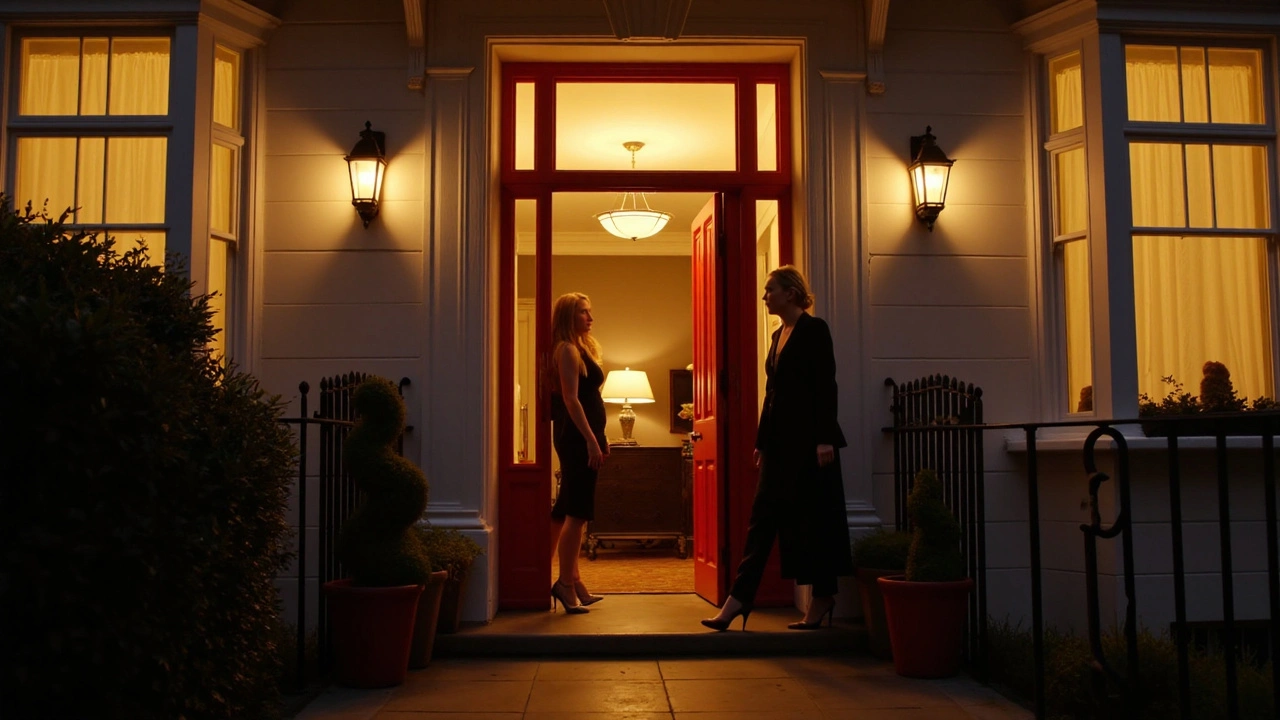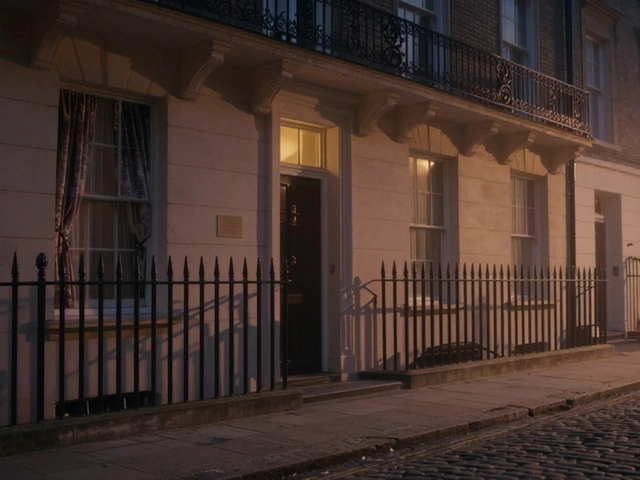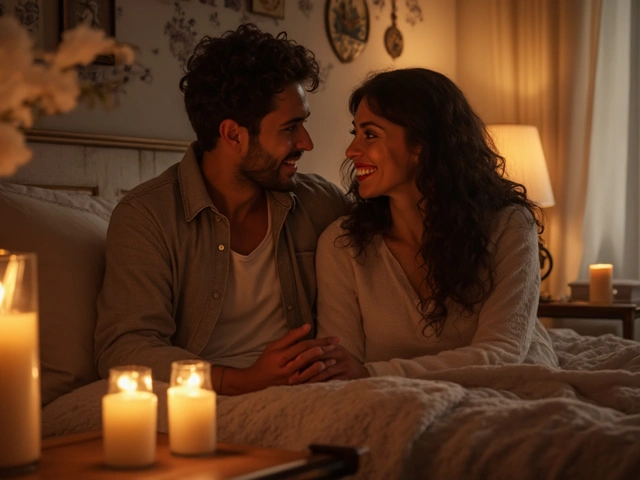When you think of London’s nightlife, you probably picture dimly lit pubs, live jazz in Soho, or the buzz of a club at 2 a.m. But tucked beneath the surface of that energy is another thread-long-standing, quietly evolving, and often misunderstood: the world of independent women offering companionship and intimacy in the city. The term call girls has changed meaning over decades. It’s no longer the shadowy figure from 1970s films. Today, it’s a complex mix of autonomy, digital platforms, personal boundaries, and shifting social norms.
What Exactly Are Call Girls in London Today?
Let’s clear up the confusion right away. A "call girl" in modern London isn’t someone waiting on a street corner. She’s likely a woman who runs her own business-often from a private flat in Chelsea, a co-living space in Shoreditch, or even a short-term rental in Notting Hill. She sets her own hours, prices, and rules. Many don’t even use the term "call girl" anymore. They call themselves independent escorts, companions, or luxury service providers.
The shift started in the early 2000s. Before then, most women in this space worked through agencies that took 50% or more of their earnings, dictated who they met, and controlled their schedules. Today, thanks to encrypted messaging apps, discreet websites, and social media profiles that look like personal blogs, women control their own brand. They post photos (often artistic, never explicit), write detailed bios, and screen clients carefully. Many have degrees, full-time careers, or are studying. Some do this part-time to fund travel, pay off student loans, or save for a home.
Why This Evolution Matters
It’s not just about sex. It’s about choice. In 2015, a University of London study tracked 87 independent women in the city over three years. The majority said they entered the industry because they wanted control over their income and time-not because they had no other options. One woman, a former teacher who now works three nights a week, told researchers: "I make more in one evening than I did in a full week at the school. And I get to decide who I spend that time with. That’s power."
Legal status hasn’t changed-prostitution itself isn’t illegal in the UK, but soliciting, brothel-keeping, and pimping are. That’s why the modern scene is so quiet. No one advertises openly. No one works from a flat with a sign out front. Everything happens through vetted networks, private messaging, and word-of-mouth.
How the Scene Has Changed Since the 1980s
Back then, call girls in London were often linked to organized networks. Agencies ran out of flats in Mayfair and Knightsbridge, with receptionists answering phones and drivers waiting outside. Women had little say. If a client demanded something they didn’t want, they had to comply-or lose their job.
Today? The power is reversed. Women choose their clients. Many use screening tools: asking for ID, doing video calls before meeting, requiring references, or even using third-party verification services. Some only meet clients who come recommended by past customers. Others use apps like PrivateApp or EliteCompanions, platforms built specifically for discretion and safety.
The rise of cryptocurrency payments has also changed things. Cash is still common, but Bitcoin and Monero are increasingly used. Why? Because they leave no paper trail. No bank record. No traceable transaction. For women who want to stay off the radar, this is a game-changer.
Where You’ll Find Them Now
You won’t see them in the red-light districts of the past. There’s no Soho strip with women standing under streetlights. Instead, you’ll find them in places you’d never guess:
- West London-Kensington and Fulham, where professionals live and work
- North London-Hampstead and Highgate, favored by older, wealthier clients
- East London-Shoreditch and Hackney, where younger women often live and work part-time
- South London-Clapham and Peckham, quieter but growing in popularity
Many operate out of serviced apartments rented by the month. Others use luxury hotels with strict privacy policies-places like The Zetter or The Hoxton, where staff don’t ask questions. The key? Location matters less than discretion. A client might book a session in Richmond, then be picked up by a driver who doesn’t know the woman’s name.

What Clients Actually Pay
Prices vary wildly based on experience, location, and service type. Here’s what you’re likely to see in 2025:
- Basic companionship (dinner, drinks, conversation): £150-£300 per hour
- Standard escort (includes intimacy): £300-£600 per hour
- High-end or luxury service (includes travel, overnight stays): £800-£2,000 per night
- Specialized services (fetish, roleplay, etc.): £400-£1,200 per session
Most women charge a minimum of two hours. Overnight stays often come with a flat fee. Some offer package deals-three hours for £800, five for £1,200. Payment is usually made in cash or via encrypted crypto wallet. No invoices. No receipts. No receipts.
What Happens During a Session
It’s not what you see in movies. There’s no drama. No shouting. No pressure. Most sessions start with a drink, some conversation, and getting comfortable. Many clients say the biggest draw isn’t sex-it’s the absence of judgment. One man in his 50s, a tech executive, told a journalist last year: "I’ve been married 25 years. I don’t need sex. I need someone who listens without trying to fix me."
For women, it’s about boundaries. They set them clearly. No drugs. No violence. No public places. No filming. If a client crosses a line, the session ends. Immediately. And the client is blocked for life.
Many women also offer non-sexual services: a listening ear, a date for a business dinner, someone to go to the theatre with, or even help with social anxiety. The "girlfriend experience"-a term now used widely-isn’t about pretending to be someone’s partner. It’s about offering presence, warmth, and emotional safety for a few hours.
Safety First: How Women Protect Themselves
Every woman in this industry has a safety plan. Here’s what most use:
- Screening: All clients must be vetted through video call or mutual references
- Location sharing: Using apps like Life360 to share real-time location with a trusted friend
- Safe word system: A word or phrase that means "end the session now"
- Never meeting alone: Many work with a security contact who checks in every 30 minutes
- Legal backup: Some have lawyers on retainer who can intervene if a client threatens or harasses
There’s also a growing network of peer support groups. Women meet monthly in private spaces to share tips, warn about dangerous clients, and offer emotional support. These groups are anonymous, encrypted, and strictly offline.

Independent Escorts vs. Agency Escorts in London
Here’s how the two models compare:
| Feature | Independent Escorts | Agency Escorts |
|---|---|---|
| Control over schedule | Full control | Agency sets hours |
| Income retention | 85-100% | 40-60% |
| Client selection | Full control | Agency assigns clients |
| Advertising method | Private websites, encrypted apps | Public agency sites |
| Legal risk | Lower (no public ads) | Higher (easier to trace) |
| Client quality | Often higher (vetted) | Variable |
The trend is clear: more women are leaving agencies. Why? Because they want to keep more money, choose their own clients, and avoid the pressure of meeting quotas. Agencies still exist-but they’re shrinking. Many now focus on luxury travel companions or international clients.
Frequently Asked Questions
Are call girls legal in London?
Yes, but with major restrictions. Selling sex itself isn’t illegal in the UK. However, soliciting in public, running a brothel, or pimping someone else is. That’s why modern independent escorts operate privately-no streetwalking, no ads on public sites, no third parties controlling them. They work alone, from private spaces, and avoid anything that could be seen as "controlling" or "organizing" sex work.
How do I find a legitimate independent escort in London?
You don’t find them through Google or social media. Legitimate women use private, invitation-only platforms or are referred by trusted clients. If a website looks flashy, has lots of photos, or promises "instant booking," it’s likely a scam or an agency. Real independents rely on word-of-mouth, encrypted messaging apps like Signal or Telegram, and carefully curated personal websites with no contact forms.
Do call girls in London work full-time?
Most don’t. The majority work part-time-two to four nights a week. Many have other jobs: designers, teachers, freelancers, students. The income is supplemental. Only a small percentage rely on it as their sole source of income. The lifestyle is chosen for flexibility, not necessity.
Is it safe for clients to meet these women?
For clients who follow the rules, yes. Most women screen aggressively. They check IDs, require references, and avoid cash-only transactions with strangers. Clients who respect boundaries, pay on time, and don’t push limits are welcomed back. Those who don’t are blacklisted across networks. The industry is built on trust-not random encounters.
Why do women choose this work in London?
The reasons are personal. Some want financial freedom. Others enjoy the autonomy. Many say they appreciate the lack of office politics or rigid schedules. For some, it’s about reclaiming control over their bodies and choices. It’s rarely about desperation. It’s about design.
Final Thoughts
The image of the "call girl" in London has been rewritten. She’s not a victim. She’s not a stereotype. She’s a woman making decisions in a world that still judges her for it. Her work isn’t glamorous. It’s quiet, careful, and deeply personal. And it’s here-not in the headlines, but in the spaces between the lights of Soho, the quiet streets of Notting Hill, and the late-night coffee shops where clients are just people looking for connection.
If you’re curious about this world, ask yourself this: Would you want to be judged for how you earn a living? Or would you rather understand the real people behind the label?










Timothy Mayle
November 19, 2025 AT 02:23There's something profoundly existential about this shift-from transactional intimacy to curated presence. The modern escort isn't selling sex; she's selling epistemic safety. A space where the client isn't required to perform masculinity, or vulnerability, or even coherence. Just to be. And in a world that monetizes everything, this quiet commodification of emotional bandwidth feels almost revolutionary-or tragic, depending on whether you believe autonomy can exist within capitalism's scaffolding.
fred mulder
November 20, 2025 AT 06:29I’ve worked with a few women in this space over the years-mostly through mutual friends, never through apps. What struck me wasn’t the sex, it was how many of them had PhDs, or were learning Mandarin, or were raising kids on the side. They weren’t broken. They weren’t desperate. They were just… choosing differently. And honestly? I respect that more than I ever thought I would.
Alice Decogateaux
November 22, 2025 AT 04:11Let’s be real-this is just grooming for human trafficking under a ‘girlboss’ filter. These women are being groomed by dark web networks to launder money and harvest biometrics. You think they’re ‘in control’? The crypto payments? That’s how they track you. The ‘private apps’? All run by the same syndicates that used to run the old agencies. Wake up. This isn’t empowerment-it’s algorithmic exploitation.
Melanie Carp
November 23, 2025 AT 11:27Wow. I just read this whole thing and felt so seen. I’ve been a freelance writer for 8 years, and sometimes I do ‘companion gigs’ to pay rent-just dinner, walks, talking through panic attacks. No sex. Just presence. And I’ve never felt more respected than when a client says, ‘Thank you for not fixing me.’ You’re not alone. We’re all just trying to survive with dignity.
Maureen Addison-Smith
November 24, 2025 AT 15:22The linguistic evolution from ‘call girl’ to ‘independent companion’ reflects a deeper epistemological reorientation in post-industrial labor economies. One observes a paradigmatic shift wherein the female body, once subjected to patriarchal commodification, is now being strategically reclaimed as a site of sovereign agency-albeit within the confines of neoliberal market structures. The absence of institutional intermediaries, coupled with cryptographic transactional anonymity, constitutes not merely an operational innovation, but a quiet act of epistemic resistance.
Nitin Murali
November 24, 2025 AT 16:32How quaint. You’ve romanticized exploitation with the vocabulary of a TED Talk. These women aren’t ‘empowered’-they’re just the latest iteration of a centuries-old model where women trade intimacy for survival, now wrapped in a Shopify store and a Signal group. The fact that you admire their ‘autonomy’ while ignoring the structural violence that made this the only viable option for many speaks volumes about your privilege. You don’t get to call it liberation when the system still dictates the terms.
David Blair
November 25, 2025 AT 05:34Let’s pause and acknowledge the *operational excellence* here. We’re talking about women who’ve built zero-trust client ecosystems, implemented end-to-end encryption protocols, optimized pricing tiers based on demand elasticity, and deployed multi-layered safety architectures-all while navigating legal gray zones and social stigma. This isn’t just sex work. It’s a decentralized, client-driven service startup with 98% retention rates. The real story? The fact that no VC has funded this yet. That’s the real tragedy.
Andre Möller
November 26, 2025 AT 08:56My aunt used to do this in the 90s. Not for money-she said she just didn’t like being alone on weekends. She’d take clients to museums, then cook them dinner. No sex. Just company. She passed last year. Nobody knew. I think that’s the quietest kind of bravery.